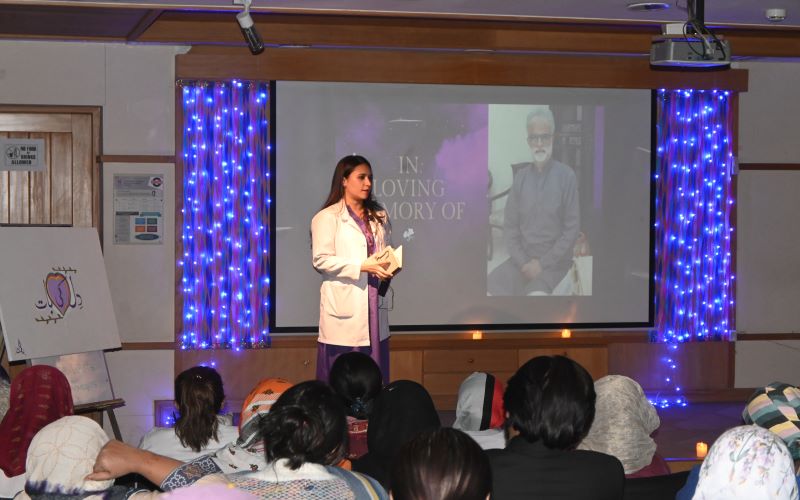Dil Ki Baat – A Journey of Remembrance
Indus Hospital & Health Network (IHHN) held “Dil Ki Baat” – a first-of-its-kind bereavement session where families of deceased patients were invited to share their experiences of losing their loved ones in the form of a story, prose, or poetry. Watching a loved one on end-of-life care or losing their life to an untreatable disease is an earth-shattering experience which leads to great emotional distress and turmoil. IHHN has made the well-being of such vulnerable caregivers and family members a priority under the mandate of its palliative care services.
Dil Ki Baat is an initiative born from this mandate and is founded on the idea that to be human is to share grief and support one another at every step of a patient’s journey – even after their death – and to extend care to their family members. Conceptualized and hosted by Dr. Samia Kazmi, Dr. Junaid Patel, Consultant, Internal Medicine, IHHN; Dr. Aiman Mushir, Resident, Pulmonology, IHHN; and the rest of IHHN’s Adult Palliative Care Team, Dil Ki Baat is a reminder that doctors must go beyond the idea of just treating the patient.
The event started off with tilawat which was followed by a welcome note by Dr. Lubna Abasi, Head of Department, Internal Medicine, and Dr. Zafar Zaidi, CEO, IHHN. The first story was by Dr. Samia Kazmi, Resident, Internal Medicine, who shared several short poems she wrote in honor of her late father. She went on to share her experience caring for Mr. Tariq, a deceased patient who made a profound impact on her that remains to this day. Mr. Tariq’s wife and children then came up to the stage to speak about his life, influence and lasting legacy.
Speaking on the occasion, Mr. Tariq’s wife said “my husband was such an incredibly accomplished man and in spite of achieving so much and being a prominent part of Pakistan’s industrial sector he lived an incredibly humble life. Even during his last days here at Indus he would say “if I don’t get better, then just remember that I am dying with the Tauheed of Allah (SWT).”
Various heartfelt stories were shared by other families who stepped up to speak freely about their experience and provide messages of support and strength to those who have undergone similar loss. Several employees at IHHN were also invited to speak at the event. This included Anam Bashir, Senior technician, Pulmonology; Dr. Pireh Saleem, Resident, Pediatrics; Dr. Saira Gulrukh, Medical Officer, Emergency Medicine; and Dr. Erj Zaidi, Resident, Family Medicine. Together, their stories chronicled the lessons of strength, patience, love and gratitude that are taught whilst caring for someone on end-of-life care and living in the aftermath of their passing.
Reflecting on the passing of her beloved parents, Dr. Anam said “Allah (SWT) has made us in such a way that our hearts can empathize with each other’s love and pain. If He did not give us any challenges in life, we would never grow. We would go through life and die not having learnt anything about ourselves.”
The event also included a short speech on the Islamic perspective on grief and bereavement by Mufti Taqi Usmani. Dr. Saima Ali, Head of Department, Emergency Medicine, IHHN, also graced the stage to share memories of her late father in the form of poetry. Madiha Mustafa, Adult Psychosocial Department, IHHN, gave a brief talk on the psychological aspect of palliative care and its importance.
Closing remarks were given by Dr. Sohail Akhtar, Head of Department and Senior Consultant, Pulmonology, IHHN, and Dr. Ashar Alam, Medical Director, IHHN, who thanked the speakers for taking the time out to share their stories and the audience for their attendance. Refreshments were served at the end of the event.
The event was held at The Indus Hospital, Korangi Campus on December 16, 2022.




